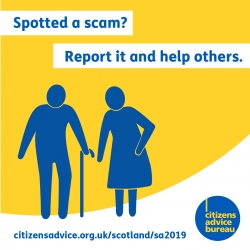
The Scams Awareness 2019 campaign took place in June 2019.
Information on the campaign is below, along with the national campaign evaluation.
Background
Scams aren’t just a minor inconvenience to people. Aside from financial loss, they can cause distress, misery and even if a scam has been avoided, it can lead to widespread loss of consumer confidence.
Under-reporting and stigma continue to be barriers in scams and fraud. There are so many types of scams, with new scams tactics consistently emerging and tricking consumers; as well as scams that we don’t know about, which makes it very difficult to help, prevent and support those who have fallen victim.
For the two-week campaign we will be targeting two demographic groups, young people and older people. Although anyone can be the target of a scammer, research demonstrates that certain groups are more easily susceptible.
- Week 1: Young people (16 - 25)
Young people are unlikely to report a scam, should it happen to them. As digital natives, they are confident when using the internet, leading them to feel that they are unlikely to fall for online scams that target them via social media and website advertising. They are often found to be victims of online scams, such as subscription traps, job scams and identity fraud.
- Week 2: Older people (65+)
Older people are often targeted by a range of scammers, a number of times. The average age of reported scams victims is 75 and those over 70 have the highest level of detriment from a range of scams, targeted by landline phone and mail. Although older people often report scams, they can lack confidence in their ability to protect themselves against scammers which makes them more vulnerable.
For Your Benefit campaign
As part of our campaign programme for 2019/20, the Scams Awareness campaign forms part of our wider campaigning mechanism, For Your Benefit. At the heart of this, we want to tackle stigma head on and our campaign creative is accessible, inclusive and empowering with the ultimate objective of challenging public perceptions, de-stigmatising and encouraging people to take action.
How can you get involved?
If you would like to get involved with the Scams Awareness 2019 campaign there are a number of things you can do:
- Visit our resources hub to help you campaign offline and online
- Promote the Scams Awareness campaign on social media, search the hashtag #ScamAware and join the conversation
- Host an engagement event in your local community to raise awareness of scammers
Key contacts
If you have any further questions or would like further information about the campaign, please contact Emily Liddle, Campaigns Officer, emily.liddle@cas.org.uk